Supported File Formats
In principle, most textual, graphical, and multimedia formats are supported by ATLAS.ti. For some formats, their suitability depends on the state of your Windows system. Before deciding to use an exotic data format, you should check if this format is available and if it is sufficiently supported by your Windows system.
Textual Documents
The following file formats are supported:
| Format | File Type |
|---|---|
| MS Word | .doc; .docx; .rtf |
| Open Office | .odt |
| HyperText Markup Language | .htm; .html |
| Plain text | .txt |
| other | .ooxml |
Text documents can be edited in ATLAS.ti. This is useful to correct transcription errors, to change formatting, or to add missing information. When adding an empty text document to an ATLAS.ti project, you can also transcribe your data in ATLAS.ti. We however recommend using a dedicated transcription tool or use automated transcriptions. You can add transcripts with timestamps and synchronize them with the original audio or video file. For this you use Multimedia Transcripts.
Transcripts
ATLAS.ti supports virtually all transcription apps and services, and also allows you to transcribe within ATLAS.ti, or import transcripts that you wrote yourself. See Transcription for more details.
PDF files (Text and Graphic)
PDF files are perfect if you need the original layout. When PDF was invented, its goal was to preserve the same layout for onscreen display and in print.
If the PDF file has annotations, they are displayed in ATLAS.ti. However, they cannot be edited.
When preparing PDFs, you need to pay attention that you prepare a text PDF file and not a graphic PDF. If you do the latter, then ATLAS.ti treats it as a graphic file, and you cannot search it or retrieve text.
When scanning a text from paper, you need to use character recognition software (OCR, frequently provided with your scanner) in order to create a text PDF file. Another option is to apply character recognition in your PDF reader/writer software.
When you retrieve text from a coded PDF segment the output will be rich text. Thus, you may lose the original layout. This is due to the nature of PDF as mentioned above. It is a layout format and not meant for text processing.
PDF with annotations / Word files with comments
If you have made annotations in Word or PDF files, ATLAS.ti will turn the highlighted area into a quotation. The text of the annotation will be added as a comment to the quotation.
If you added handwritten drawings or comments, those will be imported as image quotations (in ATLAS.ti Windows currently only supported for PDF documents).
-
Imported comments from Word will be coded with the code Imported comments.
-
Imported comments from PDF documents will be coded with the code Imported annotations.
PDF documents with annotations imported in ATLAS.ti
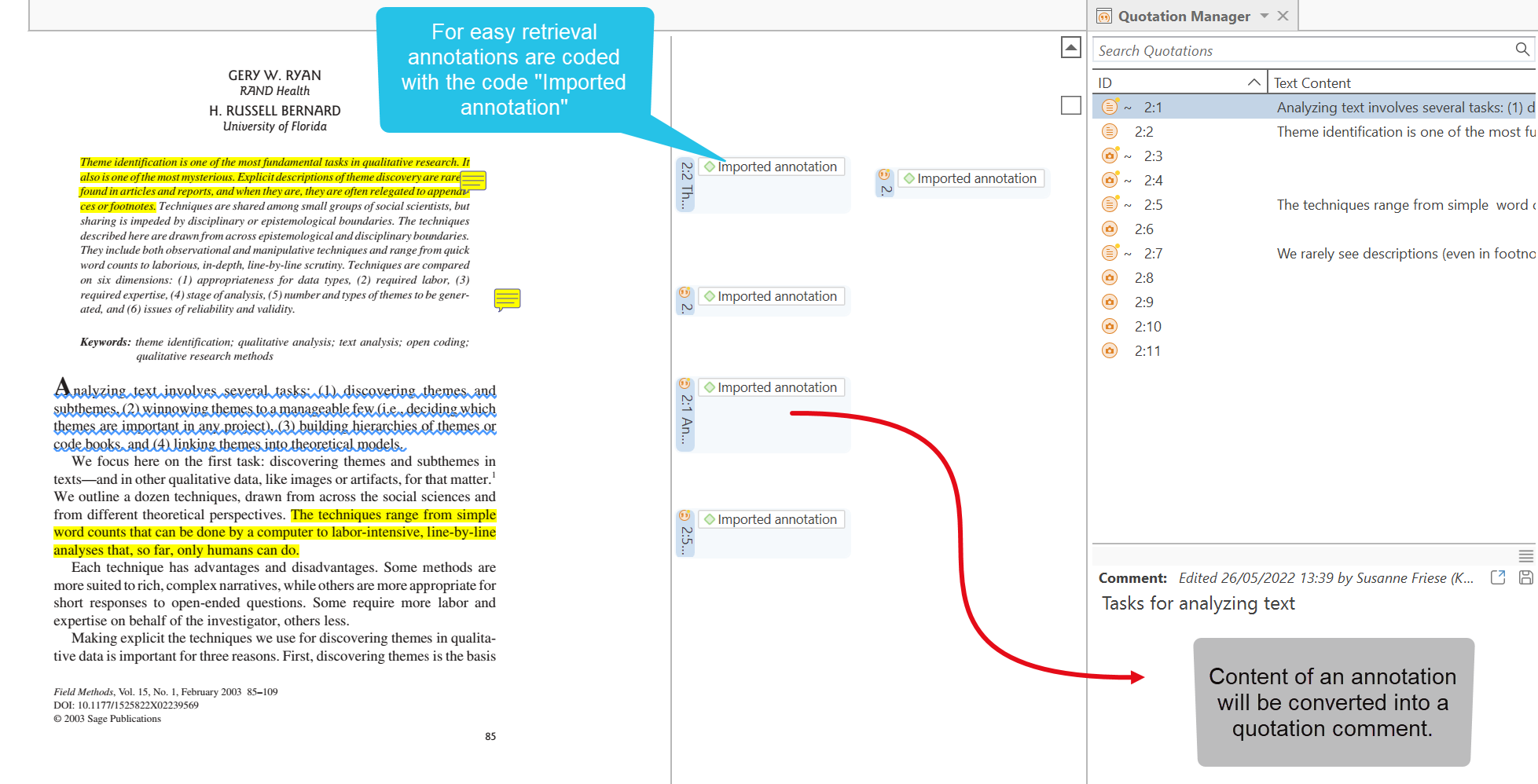
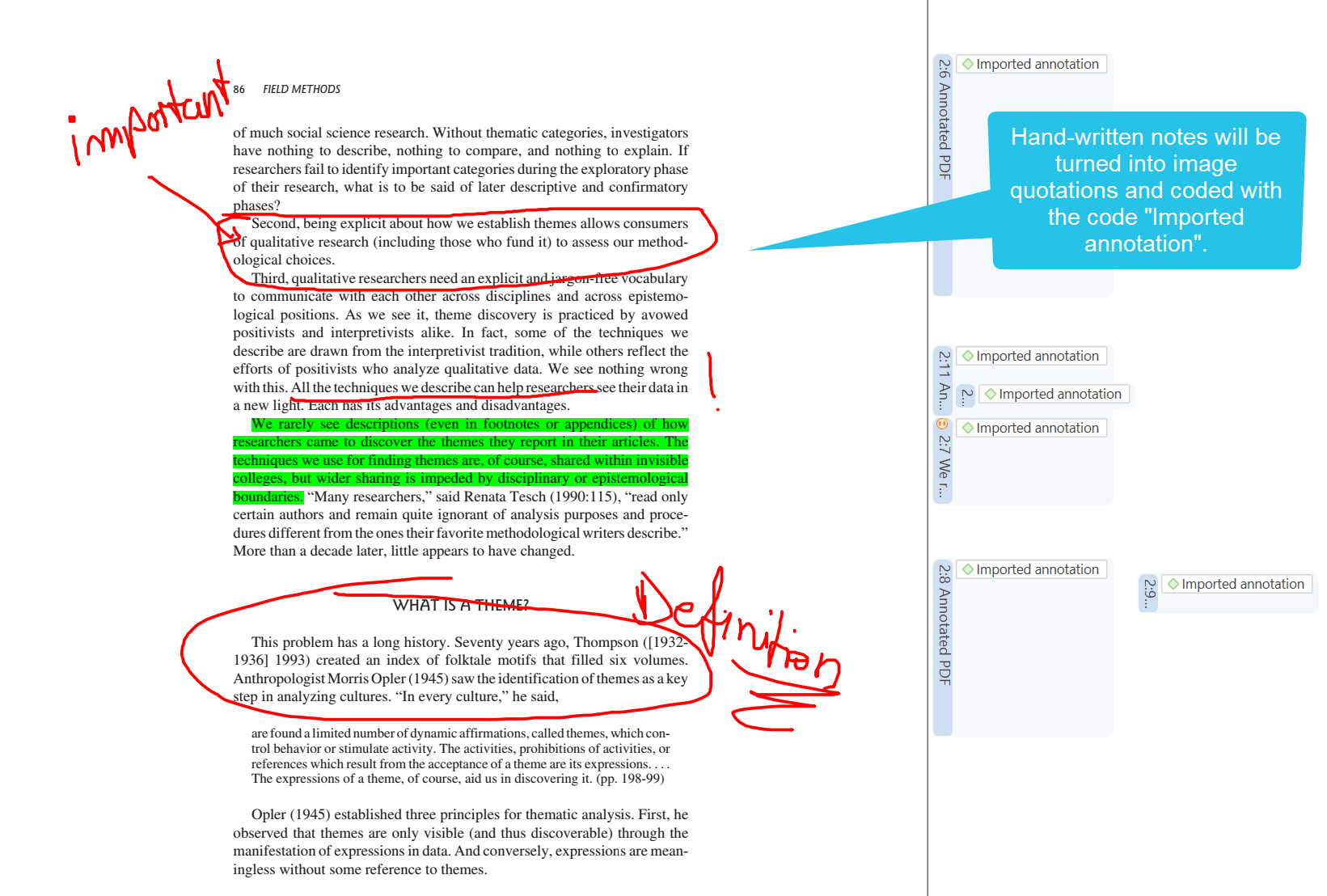
Word document with comments
Perhaps you first read a transcript in Word and write initial coding ideas as comments in the margin. If you add this transcript to ATLAS.ti, all commented segments will already be marked as quotations.
Open the Quotation Manager alongside the document, so you can read the comments you wrote. Based on your comments you can begin with your coding work. Go through each quotation, open the coding tool and create new codes, or apply existing ones.
Another option is to prepare an Excel table based on the comments you wrote and import it as your initial code list. See Immporting a codebook.
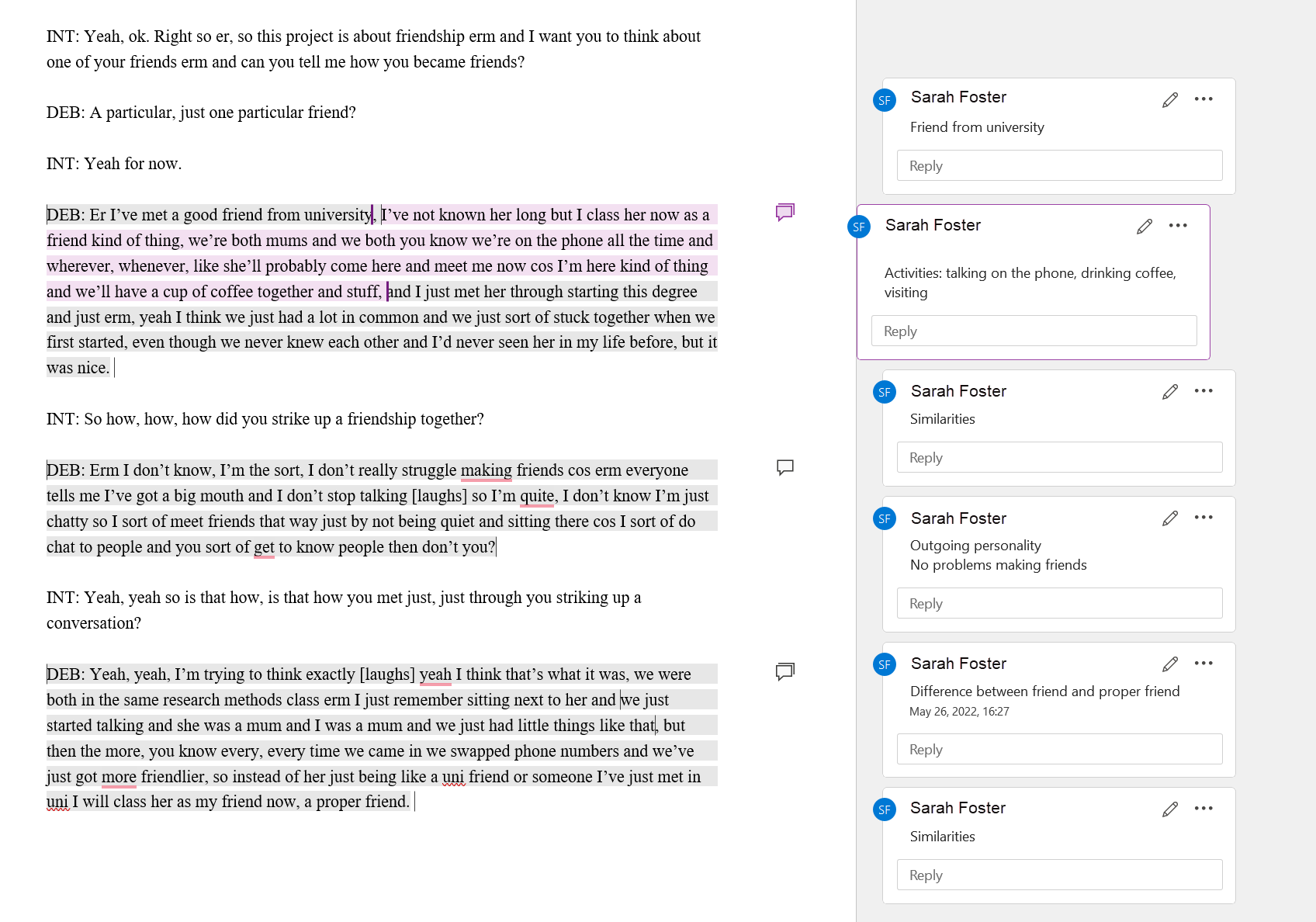
In the image below you see, how it looks like when this document is imported in ATLAS.ti:
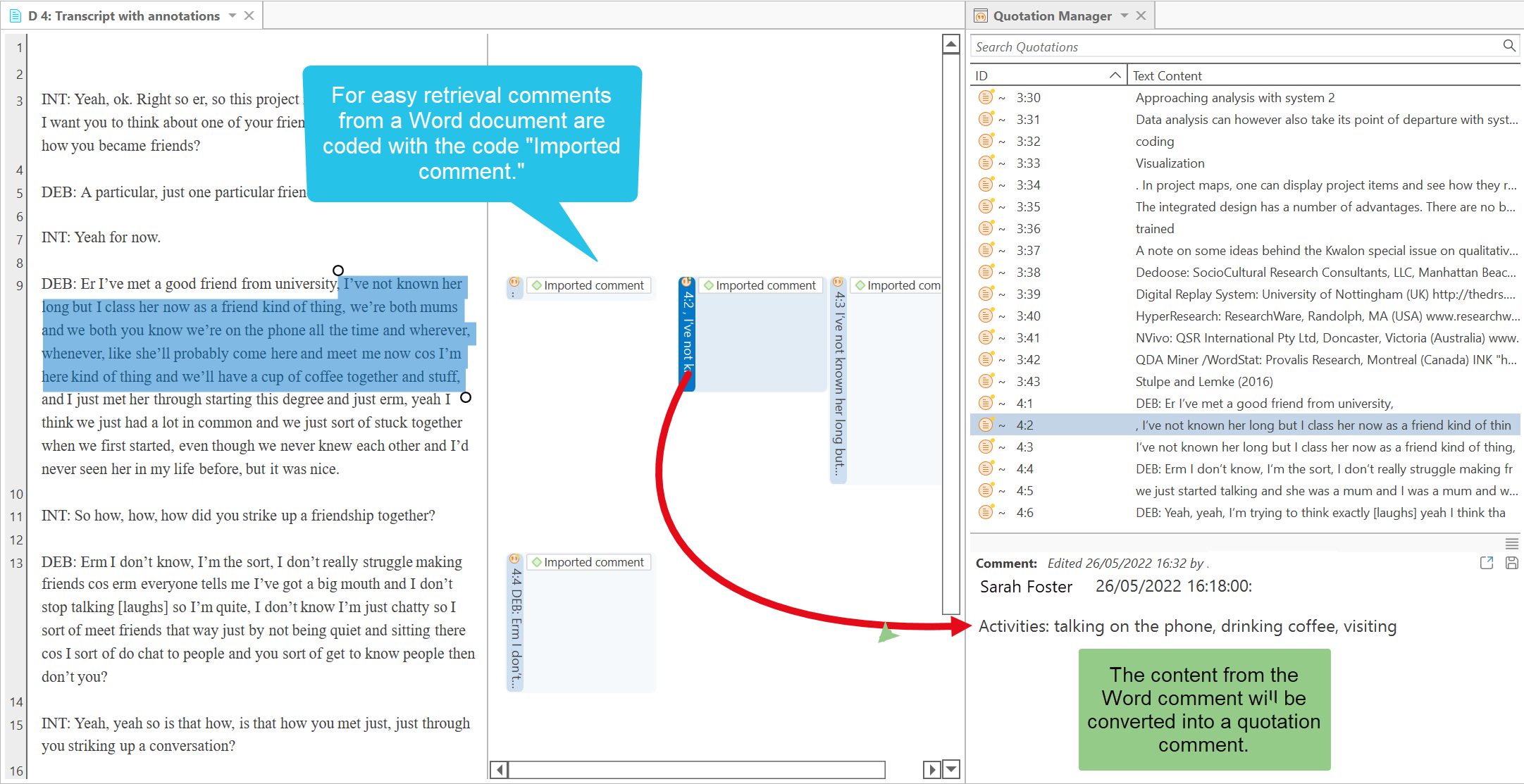
PDF files with bookmarks
If your PDF documents have bookmarks, you can also use them in ATLAS.ti.
Load a PDF document that has bookmarks.
In the contextual ribbon for Documents, click on View and activate Show Bookmarks:

You can use the bookmarks to navigate through your PDF document:
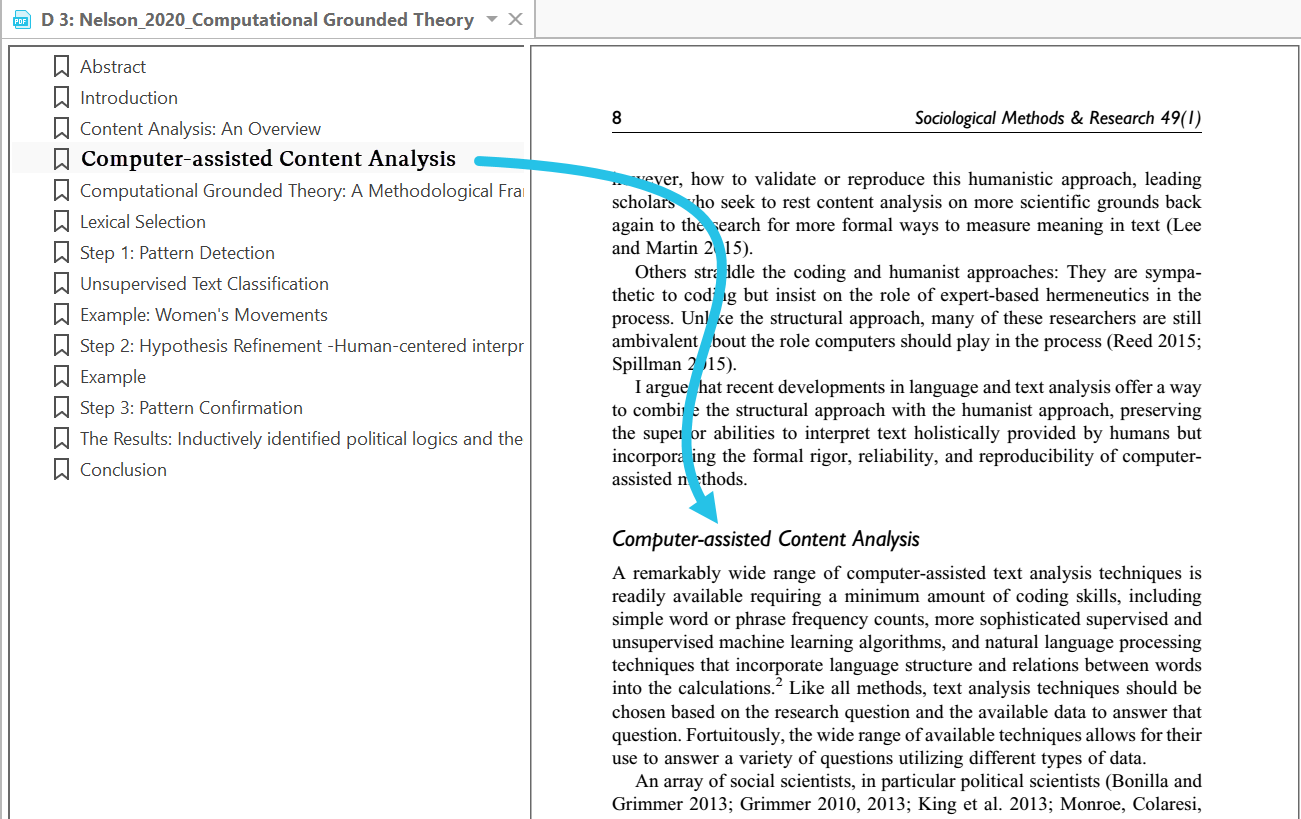
PDF files (eBooks, PowerPoint, Spreadsheets, Visio, Draw)
The following file types will be transformed into PDF files, when adding them to an ATLAS.ti project:
- Ebooks (.mobi)
- Excel (.xls and .xlsx) and Libre Office Calc (.ods) spreadsheets
- Powerpoint (.ppt and .pptx)
- Libre Office Impress (.odp) presentations
- Visio (.vsd and .vsdx) and Libre Office Draw (.odg) documents
Images
Supported graphic file formats are: bmp, gif, jpeg, jpg, png, tif and tiff.
Size recommendation: Digital cameras and scanners often create images with a resolution that significantly exceeds the resolution of your screen. When preparing a graphic file for use with ATLAS.ti, use image-processing software to reduce the size so that the graphics are comfortably displayed on your computer screen. ATLAS.ti does resize the images if they are too big. But this requires additional computer resources and unnecessarily uses space on your computer hard disk.
To resize and image manually, you can use the zoom function via the mouse wheel or the zoom button in ATLAS.ti.
Audio- and Video Documents
Supported audio file formats are: aac, m4a, mp3, mp4, wav. Supported video file formats are; 3g2, 3gp, 3gp2, 3gpp, asf, avi, m4v, mov, mp4, wmv For audio files, our recommendation is to use *.mp3 files with AAC audio, and for video files *.mp4 file with AAC audio and H.264 video. These can be played both in the Windows and in the Mac version. More information is available here. As video files can be quite sizable, we recommend linking video files to an ATLAS.ti projects rather than to import them. See Adding Documents for further information.
Geo Documents
When you want to work with Geo data, you only need to add a new Geo Document to your ATLAS.ti project. This opens an Open Street world map. When you click on the option Query Address, you can navigate to a specific region or location on the map. For more information, see Working With Geo Docs.
Social Network Comments
ATLAS.ti imports Excel files generated by exportcomments.com. You can use the service for free to export up to 100 comments per link. For a small fee, you can use the service for three days to download the data you need. This also allows you to export nested comments.
Supported social networks are:
- YouTube
- TikTok
- VK
- Twitch
- Discord
For further information see Importing Social Network Data.
Survey Data
The survey import option allows you to import data via an Excel spreadsheet (.xls or .xlsx files). Its main purpose is to support the analysis of open-ended questions. However, this option can also be used for other case-based data that can easily be prepared in form of an Excel table.
In addition to the answers to open-ended questions, data attributes (variables) can also be imported. These will be turned into document groups in ATLAS.ti. For more information, see Working With Survey Data.
Reference Manager Data
In order to support doing a Literature Review with ATLAS.ti, you can import articles from reference managers. The requirement is that you are using a reference manager that can export data as Endnote XML file like Endnote, Mendeley, Zotero, or Reference Manager.
If your reference manager cannot export data in Endnote xml format, you can export data in RIS or BIB format and use the free version of Mendeley or Zotero to produce the xml output for ATLAS.ti.
See Working With Reference Manager Data.
You can collect data from Twitter searching for keywords, hashtags, users, etc. ATLAS.ti can collect tweets that are not older than one week !
You need to sign in with your own Twitter account to import twitter data to ATLAS.ti. See Working With Twitter Data.
Evernote
If you collect and store you data using Evernote, you can directly import files and folders from Evernote. See Bring out the best in Evernote with ATLAS.ti Windows.
Supported formats are:
| Evernote Export | File Type |
|---|---|
| Evernote 2.x database | .enb |
| Evernote exported XML data | .enex |
| Evernote database | .exb |
| Evernote data | .reco |
| Evernote handwritten notes and sketches | .top |
| Evernote for Google Android note file | .enml |